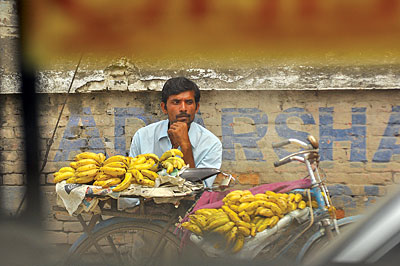 BIKRAM RAI |
In the last few weeks, distrust between Kathmandu's hill centric establishment and the small but resolute Madhesi constituency has been growing. What happened in the BBC Nepali Service studio last week could have been a coincidence, but it set off a fierce debate in the media.
The broadcast was followed by a backlash in Prashant Jha's article in The Kathmandu Post on 27 July, and a sharp rebuttal to it by Dhruba Nepal in Nagarik on 29 July.
In the interview, when Jitendra Sonal refused to conform to Nepali nationalism devoid of his Madhesi identity, host Rabindra Mishra asked him: "Would you put Madhesi interest before that of Nepal?" The way this question was put reflected the thought process of Kathmandu's hill community and summed up their position: you cannot be working in the national interest if you are working in the interest of Madhes. Mishra refused to acknowledge a significant remark made by Sonal, "The existence of Madhes is tied to the existence of Nepal".
Dipendra Jha of Democratic Freedom and Human Rights (DFHRI) sees a danger in the Kathmandu political establishment's hardened stance on the Madhes.
"This will only weaken the moderate position in Madhes and strengthen separatist tendencies," he says. Although instances of political violence has gone down in the Tarai, there is widespread proliferation of small arms indicating that politics is giving way to crime.
There is simmering frustration among the unemployed youth of the Madhes who can neither find a job in Nepal, nor can they any longer go across the border for fear of being called a "Maoist". They are told: "Yahaan kyo aate ho, tumhaara Prachanda khaana nahi deta hai tumko?" (Why are you here, doesn't your Prachanda feed you?)
On 10 June, local postman Dhirja Hatoo was brutally murdered by an armed assailant in Bara bordering Ghodasahan village. The police followed the suspect into the district of East Champaran in Bihar, but was shocked to find that the culprit was being felicitated by the local police as a 'Naxal killer'. Local rivalry along with greed for easy money in absence of a strong state presence has made the Madhes a fertile breeding ground for criminals.
The Madhes movement of the winter of 2007-8 was an eruption of grievances piled up from years of discrimination and being treated shabbily by the hill-dominated Nepali state. After the steam was let off, four years later the pressure is building up again.
"I collect trash from their bins, but I am treated worse than the trash I collect," a Madhesi garbage collector told me recently. "Ask them if they behave in the same way with the Pahaadi garbage man." He has no doubt in his mind that this is racism. What does being a "Nepali" mean to thousands like this garbage collector who are reminded everyday of being second class citizens in their own land?
The fact that we have two Madhesis as ceremonial heads of the state is not enough to convince us that we are a multicultural republic, because it cannot bridge the prejudice we hold against 'bhaiyyas'.
Bhim Rai from Morang writes to Nagarik in response to Dhruba Nepal's article: "Nepal is a land of people belonging to various nationalities living within a state. I belong to the Kirati community and have every right to assert my identity and be proud of it, and so does a Madhesi."
Madhesis are Nepalis, but they must be allowed to accept this on their own terms, not ones dictated by others.
Read also:
Maoist Prime Minister Jhalanath Khanal, EDITORIAL
Won't take it lying down, ANURAG ACHARYA



